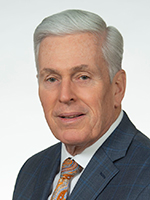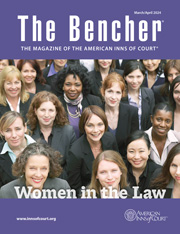Delaware Supreme Court Stays Abreast of Emerging Technologies
The Bencher | March/April 2024
By Chief Judge Michael K. Newell and Ryan P. Newell, Esquire


 In 2013, the Delaware Supreme Court took an unprecedented step for American courts in forming the Delaware Commission on Law and Technology. The commission paved new ground by educating attorneys about emerging technologies and the implications on their practice. Its creation was timely. In 2012, the American Bar Association amended Rule 1.1 of the Model Rules of Professional Conduct to require attorneys to “keep abreast of changes in the law and its practice, including the benefits and risks associated with relevant technology.” In 2013, the Delaware Supreme Court followed suit, and the commission has successfully helped Delaware attorneys comply with its version of Rule 1.1.
In 2013, the Delaware Supreme Court took an unprecedented step for American courts in forming the Delaware Commission on Law and Technology. The commission paved new ground by educating attorneys about emerging technologies and the implications on their practice. Its creation was timely. In 2012, the American Bar Association amended Rule 1.1 of the Model Rules of Professional Conduct to require attorneys to “keep abreast of changes in the law and its practice, including the benefits and risks associated with relevant technology.” In 2013, the Delaware Supreme Court followed suit, and the commission has successfully helped Delaware attorneys comply with its version of Rule 1.1.
Since then, new technologies have arisen, such as generative artificial intelligence (AI) and cryptocurrency. Accordingly, in September 2023, the Delaware Supreme Court charged the commission with “assessing the current and developing technology applicable in Delaware courts and the practice of law in Delaware.”
This renewed focus has been led by Delaware Supreme Court Justice Karen L. Valihura. “One of the great challenges that lawyers, judges, and litigants face today is developing and maintaining a sufficient level of competency in the ever-evolving world of technology. The commission will assist those constituencies in that educational effort,” Valihura said. She gave a preview of how the commission will be organized and what its focus will be:
The commission will form a number of working committees to assist it in studying subjects such as generative AI, including the ethical issues presented when lawyers use such technology in court filings. Other areas include courtroom technology and substantive areas of developing technology in the financial world, including such subjects as cryptocurrencies and bitcoin. We want to be poised in Delaware to be able to competently address issues that relate or involve such subjects as they might arise in litigation before our courts.
The commission will also be keenly focused on the role of technology and facilitating access to justice in Delaware for low- and moderate-income Delawareans.
Indeed, the commission’s focus on the litigant experience and challenges with courtroom technology is consistent with Delaware’s goal of improving access to justice. In recent years, the Delaware judiciary has addressed the ability of self-represented parties to introduce evidence located on their cell phones through the use of user-friendly technology courtrooms. Following a study on the use of personal electronic devices, the Delaware Supreme Court reversed its rules prohibiting the public from bringing their personal devices into the courthouses. This pilot program by the Delaware Supreme Court will be reviewed after the submission of a final report due March 15, 2024.
Superior Court Judge Sean P. Lugg, a charter member of the commission, is co-chairing the commission with Valihura. According to Lugg, “The Delaware bench and bar maintain a longstanding commitment to ensuring developing technology is seamlessly incorporated into the practice of law within established ethical and professional boundaries. I expect the commission’s updated focus will allow us to continue to integrate ever-changing technology in a way that best serves all—lawyers and non-lawyers alike—who engage Delaware’s legal system. I am honored to remain a part of this important endeavor.”
Kevin F. Brady, Esquire, and Richard K. Herrmann, Esquire—both experts in law and technology and members of the Delaware Bar—were responsible for creating the Richard K. Herrmann Technology American Inn of Court in Wilmington, Delaware. Shortly, after the Inn’s formation, they also assisted the Delaware Supreme Court in establishing the Commission on Law and Technology in 2013.
According to Brady and Herrmann, “Since the 1990s, the role of technology has significantly changed the way and the pace at which lawyers practice law. That has led to a gap in traditional legal training and development for new and experienced lawyers that traditional legal education could not fill. There was a need to understand the interface between the law and the technology within the context of a rapidly changing landscape. The idea for the Commission arose out of a need for a resource for Delaware judges and lawyers to provide advice on how to remain competent in the practice of law in the emerging world of legal technology.”
Thanks to Justice Karen L. Valihura; Judge Sean P. Lugg; Kevin Brady, Esquire; and Richard K. Herrmann, Esquire, for their contributions to this article.
Michael K. Newell is the chief judge of the Family Court of the State of Delaware. He is a member and past president of the Melson-Arsht American Inn of Court and a member of the Richard K. Herrmann Technology American Inn of Court in Wilmington, Delaware. Ryan P. Newell, Esquire, is a partner at Young Conaway Stargatt & Taylor, LLP in Wilmington, Delaware. He is president of the Richard K. Herrmann Technology American Inn of Court.